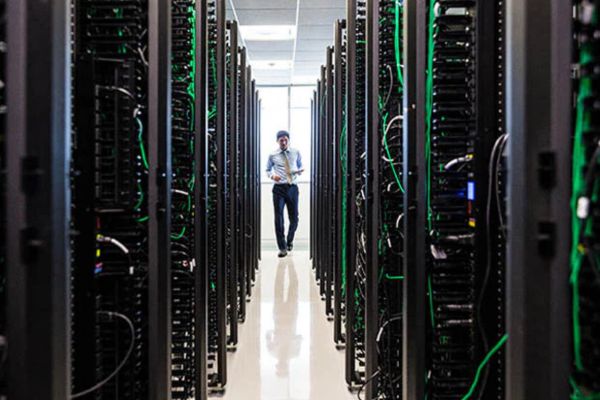According to Cervicorn Consulting, the global data center market is expected to reach around USD 481.73 billion by 2034, up from USD 217.65 billion in 2024. It is expanding at a CAGR of 11.4% from 2025 to 2034. The growing demand for cloud computing services, the rapid adoption of IoT devices, and the rise of data-intensive applications are all fueling substantial growth in the data center market. Technological advancements like artificial intelligence (AI) integration, edge computing, and increased investments in IT infrastructure, alongside regional digital transformation initiatives, are further accelerating this market’s expansion.
Data centers provide the infrastructure to store large volumes of data, ensuring that information is organized, accessible, and protected. They enable businesses to maintain databases, backups, and other critical data storage needs. They ensure the availability and reliability of services. By housing redundant power systems, cooling mechanisms, and network connections, data centers protect against downtime, ensuring continuous operation even during technical failures or power disruptions. Data centers offer the ability to scale up operations as business demands grow. This means companies can increase computing power, storage, and network capacity without major infrastructure changes or disruptions. Data centers are equipped with advanced physical security measures (like surveillance, access control) and cybersecurity systems to protect against threats such as cyberattacks, data breaches, or natural disasters. Many industries require that data be stored and managed according to specific regulations (e.g., GDPR, HIPAA). Data centers are designed to meet such compliance standards, ensuring that sensitive data is handled appropriately.
Expansion of Cloud Computing Adoption
The widespread adoption of cloud computing is a major driver of growth in the data center market, as more industries move to cloud platforms for scalability, cost-effectiveness, and enhanced accessibility. Cloud service providers depend on strong data centers to accommodate their growing infrastructure needs. The increasing demand for hybrid cloud environments, which combine both private and public cloud solutions, is pushing more investments into modernizing data centers. Additionally, the rise of digital transformation, propelled by the adoption of SaaS platforms and data-heavy applications, has made cloud computing a fundamental component of business strategies. Data centers are crucial in providing the storage, processing, and networking resources necessary for cloud operations. For example, in February 2024, Akamai launched Akamai Connected Cloud, offering advanced cloud services designed to optimize distributed network solutions, boosting scalability, performance, and security for global enterprises.
Shift Toward Sustainability and Green Data Centers
Sustainability has become a major focus in the global data center market, with a heightened emphasis on energy efficiency and reducing environmental impact. Many companies are investing heavily in green data centers, utilizing renewable energy sources like wind and solar power, along with energy-efficient cooling systems. This shift is driven by rising energy costs, stricter environmental regulations, and corporate social responsibility initiatives. As environmental concerns intensify, data centers are increasingly adopting sustainable practices to minimize their carbon footprints while maintaining high performance. These efforts are advancing energy management and eco-friendly infrastructure design, thereby contributing to the growth of the data center market. For instance, in October 2024, DSM Group unveiled its Eco Data Center in England, which integrates state-of-the-art cooling technology and a 200kW solar farm to provide renewable energy for operations.
Integration of AI and Machine Learning Technologies
The integration of artificial intelligence (AI) and machine learning (ML) technologies is driving the demand for advanced data centers, due to their significant computational and storage requirements. These technologies are becoming increasingly prevalent across industries such as healthcare, autonomous systems, finance, and retail, where vast amounts of data need to be processed and analyzed. High-performance computing (HPC) systems within data centers are essential for efficiently training and deploying AI/ML models. As AI applications like natural language processing and computer vision continue to evolve, they further amplify the need for specialized data center infrastructure. With organizations increasing their investments in AI and ML, the demand for scalable, efficient, and reliable data centers is expected to rise dramatically in the coming years.
Energy Consumption Challenges
Data centers are notorious for their high energy consumption, which raises operational costs and environmental concerns. The growing demand for computational power, particularly in AI, big data, and cloud services, exacerbates this issue. While energy-efficient technologies and renewable energy solutions are being incorporated, they often come with significant initial investments. Governments and organizations are imposing stricter regulations on energy consumption and carbon emissions, adding to compliance challenges. The key issue lies in balancing high performance and capacity with minimizing environmental impact, a critical challenge for ensuring the long-term sustainability of data centers.
Companies operating in the Data Center Market
- Digital Realty
- Dataspan
- Equinix, Inc.
- Google Cloud
- IBM
- Schneider Electric SE
- Microsoft
- NTT Communications Corporation
- Oracle
- ABB Ltd
- Cisco Systems Inc.
- Tencent Cloud
- Amazon Web Services, Inc.
- Eaton Corporation
- AT&T Intellectual Property
- CyrusOne
- Alibaba Cloud
- Lumen Technologies (CenturyLink)
- IBM Corporation
- China Telecom Americas, Inc.
- CoreSite
- Siemens AG
Read more details@ https://www.cervicornconsulting.com/data-center-market














